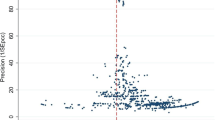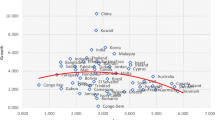Abstract
This paper argues that growth theory needs a more general notion of “regularity” than that of exponential growth. We suggest that paths along which the rate of decline of the growth rate is proportional to the growth rate itself deserve attention. This opens up for considering a richer set of parameter combinations than in standard growth models. Moreover, it avoids the usual oversimplistic dichotomy of either exponential growth or stagnation. Allowing zero population growth in three different growth models (the Jones R&D-based model, a learning-by-doing model, and an embodied technical change model) serves as illustration that a continuum of “regular” growth processes fill the whole range between exponential growth and complete stagnation.
Similar content being viewed by others
References
Aghion P., Howitt P.: A model of growth through creative destruction. Econometrica 60, 323–351 (1992)
Alvarez-Pelaez M.J., Groth C.: Too little or too much R&D?. Eur Econ Rev 49, 437–456 (2005)
Arnold L.: The dynamics of the Jones R&D growth model. Rev Econ Dyn 9, 143–152 (2006)
Arrow K.J.: The economic implications of learning by doing. Rev Econ Stud 29, 153–173 (1962)
Asheim G.B., Buchholz W., Hartwick J.M., Mitra T., Withagen C.A.: Constant savings rates and quasi-arithmetic population growth under exhaustible resource constraints. J Environ Econ Manag 53, 213–229 (2007)
Attanasio O., Weber G.: Is Consumption Growth Consistent with Intertemporal Optimization?. J Political Econ 103, 1121–1157 (1995)
Barro R.J., Sala-i-Martin X.: Economic Growth, 2nd edn. MIT Press, Cambridge (2004)
Blanchard O.J., Fischer S.: Lectures on Macroeconomics. MIT Press, Cambridge (1989)
Boucekkine R., del Rio F., Licandro O.: Embodied technological change, learning-by-doing and the productivity slowdown. Scand J Econ 105(1), 87–97 (2003)
Dasgupta P., Heal G.: Economic Theory and Exhaustible Resources. Cambridge University Press, Cambridge (1979)
Greenwood J., Hercowitz Z., Krusell P.: Long-run implications of investment-specific technological change. Am Econ Rev 87(3), 342–362 (1997)
Grossman G.M., Helpman E.: Innovation and Growth in the Global Economy. MIT Press, Cambridge (1991)
Growiec J.: Beyond the linearity critique: the knife-edge assumption of steady-state growth. Econ Theory 31(3), 489–499 (2007)
Growiec, J.: Knife-edge conditions in the modeling of long-run growth regularities. Working Paper, Warsaw School of Economics (2008)
Hakenes H., Irmen A.: On the long-run evolution of technological knowledge. Econ Theory 30, 171–180 (2007)
Hartwick J.M.: Intergenerational equity and the investing of rents from exhaustible resources. Am Econ Rev 67, 972–974 (1977)
Jones C.I.: R&D-based models of economic growth. J Political Econ 103, 759–784 (1995)
Jones C.I.: Growth and ideas. In: Aghion, P., Durlauf, S.N. (eds) Handbook of Economic Growth, vol. I.B., pp. 1063–1111. Elsevier, Amsterdam (2005)
Kremer M.: Population growth and technological change: one million B.C. to 1990. Q J Econ 108, 681–716 (1993)
McCallum B.T.: Neoclassical vs. endogenous growth analysis: an overview. Federal Reserve Bank Richmond Econ Q Rev 82(Fall), 41–71 (1996)
Mitra T.: Limits on population growth under exhaustible resource constraints. Int Econ Rev 24, 155–168 (1983)
Pezzey J.: Exact measures of income in a hyperbolic economy. Envir Dev Econ 9, 473–484 (2004)
Ramsey F.P.: A mathematical theory of saving. Econ J 38, 543–559 (1928)
Romer P.M.: Endogenous technological change. J Political Econ 98, 71–101 (1990)
Seierstad A., Sydsaeter K.: Optimal Control Theory with Economic Applications. North Holland, Amsterdam (1987)
Solow, R.M.: Intergenerational equity and exhaustible resources. Rev Econ Stud (Symposium Issue), 29–45 (1974)
Solow R.M.: Perspectives on growth theory. J Econ Perspect 8, 45–54 (1994)
Solow, R.M.: Growth Theory without “Growth” —Notes Inspired by Rereading Oelgaard. Nationaloekonomisk Tidsskrift—Festskrift til Anders Oelgaard, 87–93 (1996)
Solow R.M.: Growth Theory. An Exposition. Oxford University Press, Oxford (2000)
United Nations: World Population Prospects. The 2004 Revision. New York (2005)
Young A.: Growth without scale effects. J Political Econ 106, 41–63 (1998)
Author information
Authors and Affiliations
Corresponding author
Additional information
For helpful comments and suggestions we would like to thank three anonymous referees, Carl-Johan Dalgaard, Hannes Egli, Jakub Growiec, Chad Jones, Sebastian Krautheim, Ingmar Schumacher, Robert Solow, Holger Strulik and participants in the Sustainable Resource Use and Economic Dynamics (SURED) Conference, Ascona, June 2006, and an EPRU seminar, University of Copenhagen, April 2007. The activities of EPRU (Economic Policy Research Unit) are financed by a grant from The National Research Foundation of Denmark.
Rights and permissions
About this article
Cite this article
Groth, C., Koch, KJ. & Steger, T.M. When economic growth is less than exponential. Econ Theory 44, 213–242 (2010). https://doi.org/10.1007/s00199-009-0480-y
Received:
Accepted:
Published:
Issue Date:
DOI: https://doi.org/10.1007/s00199-009-0480-y
Keywords
- Quasi-arithmetic growth
- Regular growth
- Semi-endogenous growth
- Knife-edge restrictions
- Learning by doing
- Embodied technical change




